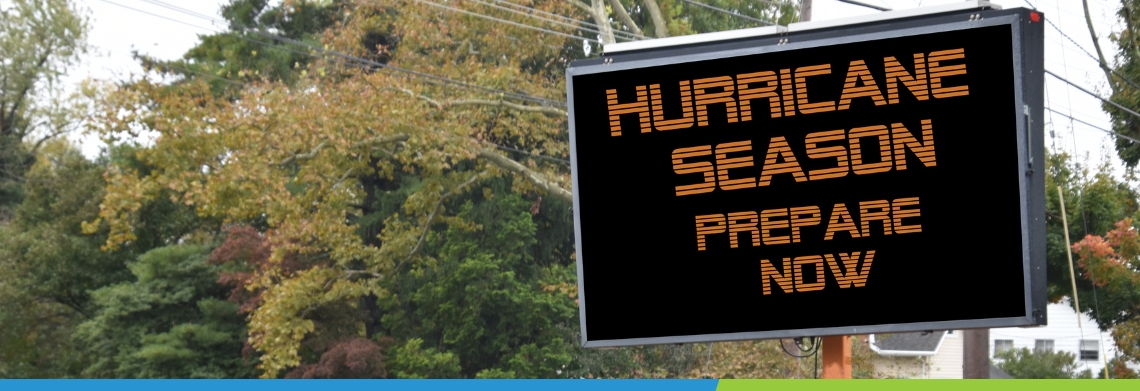
Be Prepared When Hurricane Season Arrives
Hurricanes can be swift and unpredictable, so it’s important that you prepare. Even if your area is not in the direct path of a hurricane, you may still experience power outages, flooding, or travel hindrances due to damage from the storm.
BEFORE THE STORM- Prep and Stay Alert
-
After the first notification of a developing storm, get the latest updates from county and city officials. Listen to local radio and television reports. Check the National Hurricane Center site regularly.
-
Stock up on supplies for your home and car; buy bottled water, instant coffee, and tea bags, non-perishable food, batteries, toiletries, rain gear, flashlights, pet food, medications, a battery-operated radio, and a solar-powered phone charger.
-
Pack a bag of essential items, including a car charger, clothing, socks, shoes, toiletries, cash, and important documents (in a resealable plastic bag).
-
Get your car ready by filling up on gas, performing any necessary maintenance, checking and replenishing all fluids, replacing your windshield wipers, and filling your tires with air.
-
Keep emergency phone numbers in multiple places, and ensure everyone in the family knows the warning signs and what to expect.
-
Make a plan for finding shelter where you are or for an evacuation, depending on the advice from local officials.
-
Trim trees and shrubs around your home to minimize the risk of broken branches and debris.
DURING THE STORM: Key Survival Tips
-
Listen to local radio and television reports for weather condition updates.
-
Stay inside, even if it seems that the storm has ended, to avoid being outside when strong winds pick up.
-
Keep away from windows and outside doors, and head to a basement or bathroom. Bathtubs can provide some protection if you cover yourself with plywood or other materials.
-
Avoid using a landline telephone or touching electrical equipment.
-
If the power is out, turn off all major appliances.
-
Evacuate to a safe home or shelter if your home is flooded, or if emergency personnel has recommended for you to do so.
-
Whether you choose to stay home or evacuate, you’ll want to unplug electronics and appliances and remove air conditioner fuses.
AFTER THE STORM- What Now?
-
Let family and friends know you are safe.
-
Continue monitoring updates and instructions from local authorities.
-
If electrical appliances got wet, wait for an electrician to check the device before using it.
-
Avoid drinking or preparing food with tap water until you are sure it’s not contaminated. Keep away from floodwater and flooded roads. Drive around floodwater and not through it. Remember that flood and standing waters present health risks.
-
Stay away from downed power lines and dangerous materials.
-
Report power outages in your area to your local Transmission and Distribution Service Provider.
For more ways to prepare your home and family for severe weather, download our storm prep checklist ›